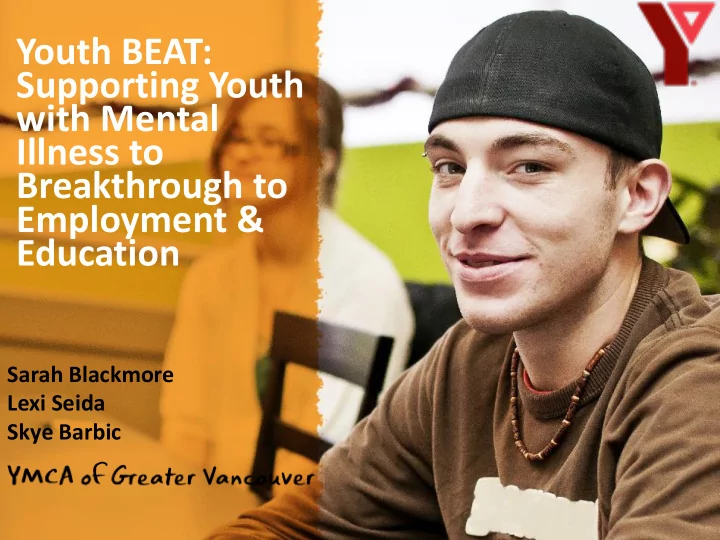

Youth BEAT: Supporting Youth with Mental Illness to Breakthrough to Employment & Education Sarah Blackmore Lexi Seida Skye Barbic
• Youth Landscape • Youth BEAT Employment Program • Participant Testimonial • Program Evaluation Strategy & Presentation of Preliminary Data • Lessons Learned & Program Adaptations • Facilitators & Barriers to Employment & Education • Questions
1. Describe an integrated supported employment program for youth and young adults with mental illness 2. Differentiate between the YMCA Youth BEAT employment program and other youth employment programs 3. Understand how participant feedback has been used to develop and refine the Youth BEAT supported youth employment program 4. Describe the barriers and facilitators to gaining and maintaining employment for youth with mental illness
In BC, 1 in 5 youth experience a mental health problem or illness. Source: Kirby, M. & Keon, W. (2004). Report 1, Mental Health, Mental Illness and Addiction: Overview Of Policies and Programs in Canada. Interim Report of the Standing Senate Committee on Social Affairs, Science And Technology.
One of the best indicators of recovery is a person’s ability to obtain and maintain meaningful employment and participate in higher education. In a recent national survey of the recovery needs of Canadians with mental illness, 87% of young adults under the age of 30 identified that “work was important to them” In the same study….only 9% indicated that they were working in any capacity (marginally, part-time, full time).
Youth BEAT was designed as a community intervention to address this gap! YMCA partnered with the Inner City Youth Program from Providence Health to develop an integrated coordinated program that could help young adults achieve: • Employment/training goals • Self-Management • Opportunities for Career Exploration • Health
Funding • Partnership Ministry of Jobs, Tourism and • Skills Training & The Canada- YMCA of Greater Vancouver & BC Jobs Fund Inner City Youth Clinic (ICY) Eligibility Criteria Youth BEAT Team • Between 15 – 29 • 2 YMCA Program Facilitators • Eligible to work in BC • YMCA Job Developer • Not currently in school • YMCA Youth Employment • Not receiving EI Programs Manager • Experiencing a mental health • YMCA Administrative Support or other barrier • ICY Occupational Therapist • ICY Peer Support Worker
Three Phases I. Phase 1 - Workshops (5 weeks) • Pre-employment & job-readiness skills • Short-term training & certification • Mental wellness & physical activity II. Phase 2 – Job Development (12 weeks) • Employment & training/education • Group & individual job development sessions • Job maintenance support III. Phase 3 – Follow Up Support (on-going) • Employment • Individualized job development support • Job maintenance support
Number of Youth Served to Date • Year 1 (4 Intakes) – 47 participants • Year 2 (1 Intake) – 14 participants Employed • Year 1 – 37 participants • Year 2 – 6 participants Further Education or Training • Year 1 – 4 participants • Year 2 – 2 participants
Leo – Intake 5 (completed Phase 1 December 9, 2016)
We have partnered with the University of British Columbia to measure the feasibility and preliminary effectiveness of the intervention:
Post onsite job BASELINE Post class training 52 weeks 32 weeks T=0 T=5 weeks T-16 weeks
• Self-esteem (Rosenberg) • Personal recovery (PROM) • Quality of Life (ReQOL, EQ-5D) • Time use (IMR) • Mental Health (PHQ-9) • Goal Attainment (Goal attainment scale)
In first 5 cohorts: 59/60 youth who started the program completed the program.
Highlights include: Changes in time use: • Baseline mean: 3.5 hours • T1 mean: 21 hours • T3 mean: 23 hours Changes in mental health and recovery
T1 T2 BL
• Inclusion of weekly evaluation forms • Modified short-term training & changed to earlier in Phase 1 • Catering budget • Financial assistance for professional wear & physical activity attire • Adapted mental wellness workshops (general topics + CBT) • Reduced & condensed workshop time • Modified transition between Phase 1 & 2 • Increased team support • Opportunities to connect with other youth programming • Tailored workshops (disclosure and Supports & Accommodations) • Individualized job development • Strengthening of community partnerships with employers
Outcome Facilitators • Meet basic needs • Safe and non-judgmental space & attitude • Structure and consistency of Phase 1 • YMCA fitness membership • Interpersonal relationships with peers & program staff • Individualized training & certification • Professional relationships (mentors & references) • Training and support in disclosure • Normalizing career development process • Identifying meaningful employment with supportive employers • Community partnerships with supported employment organizations • Continued follow up support
• Negative experiences at work (& Outcome Barriers limited knowledge of labour • Homelessness or rights) unstable/unsupported housing • Ineffective and/or lacking • Ongoing substance use, relapse communication skills or early recovery • Low self-confidence • Medication management and • Scheduled appointments with side effects service providers limit • Poor sleep hygiene availability • Travel & accessibility • Mental illness symptoms • Financial pressure • Fear and/or perception of not being ready • Lack of support • Limited work experience and/or poor work performance
The program builds off the Individual Placement Support Model with the following modifications: 1. 5 week in class session to build relationships, confidence, and to strategize/coordinate plans of support from health and social services. 2. Time limited 3. Incorporation of employment specialists, health specialists, peer support worker, and ongoing evaluation team.
- Ongoing research and focus groups with youth - Scalability of the program - Manual - Knowledge Sharing Plan - Canadian Association for Supported Employment - Canadian Association for Occupational Therapy Conference
Dr. Skye Barbic, PhD, OT Assistant Professor, University of British Columbia skye.barbic@ubc.ca Sarah Blackmore, MA, RCC Youth BEAT Program Facilitator, YMCA of Greater Vancouver Sarah.blackmore@gv.ymca.ca Lexi Seida, BA (Hons) Youth BEAT Program Facilitator, YMCA of Greater Vancouver Lexi.seida@gv.ymca.ca
Recommend
More recommend